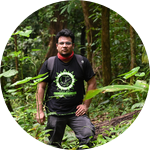About This Project
Tridimeris, genus endemic to Mexico, are critically endangered. Its large, mango-flavored fruits offer a unique conservation opportunity. This study delves into its ecology and nutritional value, focusing on phenology, pollination, and fruit characterization. We will explore the development of fruit-derived products and assess their acceptance by local communities. Our goal is to formulate a strategy that promotes community development and the conservation of this remarkable genus.
Ask the Scientists
Join The DiscussionWhat is the context of this research?
Tridimeris Bail., the only genus of Annonaceae (custard apple family) endemic to Mexico, is among the world's most endangered plant lineages. The genus comprises ten species of trees exclusively found in mountain cloud forests, limiting their distribution. Historical accounts (herbarium labels) suggest that their large, fleshy fruits, which resemble the pawpaw (genus Asimina), are edible and have a mango-like taste (confirmed with personal field observations). The potential benefits of Tridimeris fruits present a significant opportunity for conservation efforts. However, a lack of understanding of the reproductive ecology and nutritional value of Tridimeris hinders the development of effective conservation strategies. Protecting Tridimeris not only involves preserving the species but also enhancing biodiversity and promoting sustainable development within local communities, which offer long-term environmental, economic, and cultural benefits.
What is the significance of this project?
The project helps preserve a unique part of Mexico's natural heritage and contributes to global biodiversity. This comprehensive research addresses critical gaps in our understanding of the reproductive ecology and nutritional value of Tridimeris, which are essential for effective conservation efforts and for appreciating its ecological importance. The development of products derived from Tridimeris fruits, presents valuable economic opportunities, supports local livelihoods, and promotes cultural heritage through the sustainable utilization of native resources. The data generated by this project will inform conservation policies, ensuring robust protection measures and the continued survival of this remarkable genus. Furthermore, involving local laboratories, students, and researchers enhances education, builds capacity, and fosters community engagement in conservation efforts, creating a ripple effect of knowledge and awareness that benefits all stakeholders.
What are the goals of the project?
This study delves into the reproductive ecology of Tridimeris chiapensis, focusing on floral phenology, pollination experiments, and the development of fruits and seeds. We will conduct a comprehensive nutritional analysis of the fruits, examining samples from various plant origins, morphologies, and developmental stages. Additionally, we aim to develop fruit-derived products, such as chips, jams, flours, and spices, using different parts of the fruit, including the peel, seed, and pulp, followed by sensory analysis. The primary objective is to create an economic-cultural strategy that promotes local community development and the conservation of Tridimeris. By enhancing our understanding of its ecology and uses, this project aims to inform and shape conservation policies, ensuring the survival of this remarkable genus.
Budget
To understand the reproductive ecology of Tridimeris chiapensis (focal species), field observations and experiments are essential. The requested budget is crucial for field trips, stays, and ecological studies in Chiapas, Mexico, where this species is distributed.
The nutritional characterization and acceptance experiments will be conducted at the Universidad de Ciencias y Artes de Chiapas. While the necessary equipment is available, the reagents and supplies are insufficient. The requested budget will equip the laboratory, enabling us to obtain results and allowing local students and researchers to use it, thereby expanding the project's impact.
By enhancing our understanding of Tridimeris ecology and its uses, this project aims to inform and shape conservation policies, ensuring the survival of this remarkable genus
Endorsed by
 Project Timeline
Project Timeline
Tridimeris species flower in the latter half of the year and produce fruit in the early months of the following year. Consequently, the project spans a one-year period.
Jan 06, 2025
Project Launched
Aug 28, 2025
Travel to Chiapas Mexico to the distribution area of the focal species Tridimeris chiapensis
Oct 10, 2025
Carry out floral phenology observations and pollination experiments
Apr 20, 2026
Carry out observations of fruit phenology
May 04, 2026
Conduct a nutritional characterization of the fruit
Meet the Team
Affiliates
Team Bio
| Dr. Mayra Ruby Méndez Bautista, Faculty of Nutrition and Food Sciences at Unicach, focuses on using agro-industrial residues and raw materials to develop new products and/or biomaterials. Her contribution involves the nutritional characterization of Tridimeris fruits (humidity, ash, crude fat, crude protein, crude fiber, and carbohydrates) and the development of a food product, followed by a sensory analysis. |
Andres Ernesto Ortiz-Rodriguez
I am a botanist with a keen interest in the systematics, evolution, and conservation of tropical forest species. My research spans various temporal and geographic scales, employing an integrative approach that combines taxonomy, ecology, conservation, molecular phylogenetics, and phylogeography.
Project Backers
- 5Backers
- 100%Funded
- $5,550Total Donations
- $1,110.00Average Donation

